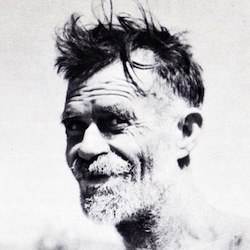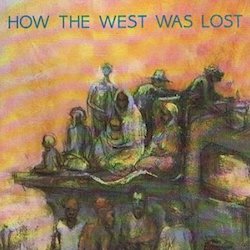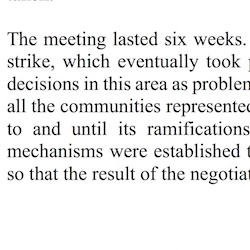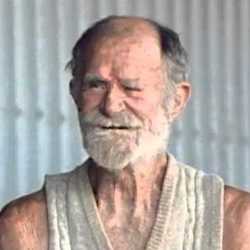In McLeod’s telling of the story of the strike, a meeting at Skull Springs in 1942 became a key feature, even though he made no mention of this event in an autobiography he drafted (with the help of a Western Australian historian) in 1955.
Don McLeod, Telling the Story of the Strike

Edited transcript of interview with Don McLeod by Chris Jeffery, 15 November 1978, State Library of Western Australia, OH331, http://purl.slwa.wa.gov.au/slwa_b1822411_4.pdf?download, pp. 16-17, 20-22
DM: Well, they wanted to know what to do and I said, “Well, they couldn’t do anything unless they organised the whole state”. And they said, “Well if we organise the whole state will you show us what to do. Will you, you know, act as our adviser, and will you get control of this fund?” And I said, “Yes, if you can guarantee that you can organise the whole state I’ll certainly show you what to do”, because I didn’t think they could do it, I thought it was too big a job for them. Because any man that pokes his nose into what the squatter was doing to black fellows was looking for trouble. Well, in 1942, which was five years later, [it] would be 1937, when we finished taking the [unintelligible] on the Ashburton, 1942, I was invited to go out to Skull Springs on the Davis River, in the Nullagine district, about two hundred miles east of Nullagine. And I met all the law men from the desert and a lot of other people besides, and we had a meeting there which took six weeks to put through. It was like a United Nations meeting, we had 24 languages, we had sixteen interpreters, and it took us six weeks to work out what we were going to do.
CJ: So, there were 24 different tribes ...
DM: Twenty-four different tribes, the lawmen ...
CJ: … represented.
DM: The whole of the state’s lawmen were there at this meeting. And they give me a crash course in native law and I gave them the way the state had fiddled with their estate and what they were entitled to and what they ought to be entitled to. And what they’d have to do to recover it. And they give me a position in the law above any lawman, in the event — since black fellows take some time to get a consensus — in the event of it needing to take a quick decision, if I took any decision, well then everybody would stick to that, they’d follow then … [End of first excerpt]
CJ: Would you tell me about the strike; how did you organise it?
DM: Well, I never organised it at all. Dooley Binbin and the people organised it, but I was ... They nominated Dooley Binbin at that meeting. If we had to have a strike he was obviously the best man to have, they knew their people, what their capacities were. He wasn’t at the meeting but they nominated him. And we had to pick up a man from the settled portion and the blokes in there picked Clancy McKenna. And these two blokes were given the job of organising the people so that on the first of May they came out on strike.
CJ: How did they get the message through to all these different tribes, to stop work on a certain day?
DM. Oh, well, Dooley Binbin went into a mate of mine in Marble Bar and he got him to give him a calendar, so that he could mark off every day, you know, until come the first of May, which was March, and then that was the date. Well, Dooley, having got that calendar, every time he went to a place he’d do another one and show them how to mark it off, so that when they come to the first of May, that was it. And then he’d go onto the next one, he’d do one there and so forth. So apparently that’s the way he did it. I wasn’t with them, because I couldn’t come within five chain of a congregation of black fellows in those, without written permission. It was worth two hundred pounds, or two years gaol or both. This had to be done in a clandestine manner.
CJ: Were you actually convicted?
DM: Yes, in due course I was up on three counts for that, tempting and persuading natives to leave their legal service. I got ₤96 odd fine or five months gaol. I got an appeal to Privy Council which I’ve never taken up. In the High Court they said that true, that the West Australian blackfellows are virtually slaves. They couldn’t leave the master without permission, they were as tightly tied as any medieval villain or serf to the Lord of the Manor. But, nevertheless, West Australia is a sovereign State, and while those laws applied, they had to be observed and if you breach them, well you have to suffer the consequences. Yet here was a state that got control, had a 70th section, had to provide one per cent of the gross revenue. Now the Act of Native Affairs which replaced the 70th section was called, and a long title, an Act to make provision for the better caring and protection of the West Australian black fellow. In fact, it was a slave act. This is how you can twist words. People who didn’t know any better thought that it was in fact better. But have a look at the Act. You couldn’t work a black fellow except under permit and when he worked under permit he couldn’t leave his legal service without the permission of the boss or the policeman who was his protector. And there was no minimum standard of wages. Now, when I was had up for enticing and persuading natives to leave their legal service on De Grey Station, we cited De Grey as an example. And Laurie O’Neill, the Inspector for Natives, he admitted that the black fellows were living in the creek, like cattle. They had no houses, they had no water supply, they had no sanitation or anything of that nature and they had no minimum standard of wage. They were getting $1.25, but the Commission was satisfied, that’s all they had to do. And that was it. Well, now here it is, they had no minimum standard of wages, they couldn’t leave their legal service, they worked on their own land to make an alien person rich and they couldn’t leave it. If they did they had to get the policeman’s permission or the boss’s permission. Who’s going to give you permission to go if you don’t have to pay wages, bloody ridiculous. And this is an Act to make provision for the better care and protection of Australian Aboriginals. Now there was another section that prevented anybody without written permission to be found within five chains of a congregation of black fellows camped or travelling in pursuance of the native custom. So that by putting that provision between the blacks and the whites nobody could come in contact with [them], nobody knew what the black fellows were doing, they were isolated on the station. So that they were illiterate, isolated and destitute … so that they’d never ever be able to claim what was legally, they were legally entitled to. And this is the so-called native question. It’s nothing to do with the black fellows, it’s all to do with a deliberate organised steal. What we got here is stolen property. We’ve stolen the black fellow’s land, we’ve given him no compensation …
Citation
Excerpts of Don McLeod oral history interview by Chris Jeffrey, 15 November 1978, State Library of Western Australia, OH331.




